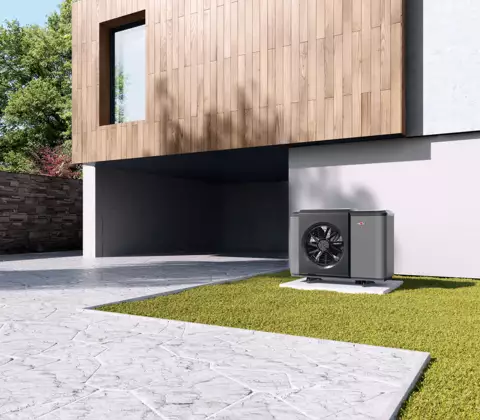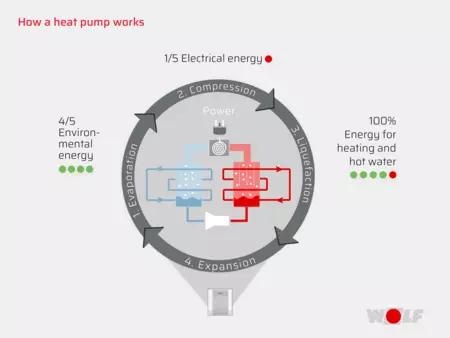
Refrigerants in heat pumps
What you need to consider
Around 120,000 heat pumps were installed in Germany in 2020. This is an increase of 40% compared to the previous year. In 2021, heat pump sales increased again by 28% and continue to grow.1 The heat pump is chiefly popular because it is an environmentally friendly option. This article explains the role played by refrigerant and what you need to look out for when buying.
What exactly is refrigerant?
DIN EN 378-1 defines refrigerant as a fluid used to transfer heat in a refrigeration system. Heat is absorbed at low temperatures and low pressures and released at higher temperatures and higher pressures. The physical state of the refrigerant changes from liquid to gas and back again during this process.
The terms refrigerant and coolant are commonly used synonymously. But this is not technically correct. A heat pump cannot work without refrigerant and a simple coolant is not sufficient for the purpose.
The differences are as follows:
- A refrigerant transports heat away even if the ambient temperature is higher than the object being cooled. These are used in refrigerators, for example.
- A coolant, on the other hand, can only transport heat away from an object when the ambient temperature is colder than the object. For example, coolant heated by a car engine releases the heat to the cooler environment.

Active cooling in applications that generate temperatures below the ambient temperature requires the use of a refrigerant. These are used, for example, in industrial applications, refrigerators, freezers or car air conditioning systems. In these cases, the temperature of the interior must always be lower than the ambient air.
Heat pumps work on the same principle but in reverse. They extract heat from the environment and supply it to the building (or heating system). Depending on the type of heat pump, the refrigerant circuit can either be installed separately or integrated into the appliance. The WOLF CHA monoblock air-to-water heat pump uses the latter configuration, for example.

Refrigerant properties
Refrigerants can have various properties depending on the area of application. However, they all have some features in common. Basically, all refrigerants have the following physical attributes:
General properties
Low boiling point.
Extremely stable chemical structure.
Condense under low pressure.
High coefficient of performance.
Low vapour volume.
Overview of refrigerant types
They differ depending on the application and type of refrigerant:
- HFC - hydrofluorocarbons (chlorine-free)
- PFC - halogenated fluorocarbons (chlorine-free)
- HFO - halogenated fluorine olefins
- Natural refrigerants (propane, for example)
- CFCs - chlorofluorocarbons (now forbidden)
- HCFCs - halogenated chlorofluorocarbons (now forbidden)
Some types of refrigerants (such as the well-known CFCs) are now banned as they damage the atmosphere’s ozone layer when they escape into the environment.
Refrigerants used in heat pumps
Currently, fluorinated hydrocarbons such as HFCs and PFCs are used as standard. These refrigerants are used in most heat pumps, and they are also commonly used in air conditioning systems in buildings and vehicles under names such as R134a.
In the future, the proportion of natural refrigerants used (such as propane (R290), ammonia or CO2) will increase. This aims to reduce the danger posed by potentially climate-damaging fluorinated refrigerants. R290 in particular is considered a viable alternative for heat pump refrigerants. This refrigerant is compatible with high leaving water temperatures, has a very low global warming potential (GWP) and is low in cost.
The GWP describes the relative global warming potential of refrigerants compared to CO2. Refrigerant circuits are usually airtight and do not need to be opened during the average life of a heating system. However, if refrigerants such as HFCs or PFCs are released into the environment through leaks or when disposing of old systems, they are thousands of times more harmful to the climate than CO2. This is why it is essential to also pay attention to the GWP value.
There are also technical aspects related to the area of application that must be taken into account. For instance, it is not always possible to simply switch to natural alternatives, such as in cases where the refrigerant has to be non-flammable. The legal basis for handling refrigerants in heat pumps and other systems is the F-Gas Regulation. The regulation covers the following aspects:
- Reduction of sales volumes of partially fluorinated hydrocarbons (PFCs) to 20% of the 2015 baseline (by 2030).
- Prohibition if climate-friendly alternatives could technically be used
- Extensive regulations on leak testing of refrigerant circuits, labelling and disposal of refrigerants
Maintenance requirements are low
Heating systems must be maintained and inspected to ensure they work perfectly. However, the F-Gas Regulation states that annual leak tests for heat pumps are only legally required for systems containing more than 5 tonnes of CO2-equivalent greenhouse gases as refrigerants. The limit even goes up to 10 tonnes for hermetically sealed systems.
A detached house will never reach this limit as a rule. Consequently, no maintenance is prescribed. If you use a monoblock heat pump such as the WOLF CHA, the entire refrigerant circuit is integrated into the appliance. Nevertheless, we would generally recommend having the entire heating system professionally inspected at regular intervals, especially as the costs are reasonable.
Find an installer now!
Find competent WOLF heating engineers in your area.
Heat pumps cannot work without refrigerants
The operating principle of a heat pump absolutely requires the use of an adequate refrigerant. But we must take any harmful impact on the climate into account as well as the technical suitability. With the proportion of fluorocarbons in heat pump refrigerants set to be reduced by a fifth by 2030, homeowners should start looking for future-proof alternatives today.
The WOLF CHA monoblock is a powerful heat pump that uses environmentally friendly refrigerant and is already available on the market. It also requires very little maintenance and works with great efficiency. However, you should always avail yourself of individual consultation before making a decision.

Top advice from WOLF
If you are looking for an efficient heat pump for your existing building or a new build, you should seek in-depth advice. Correct dimensioning and careful planning are crucial for efficient heating. The experts at WOLF will be happy to help you.


